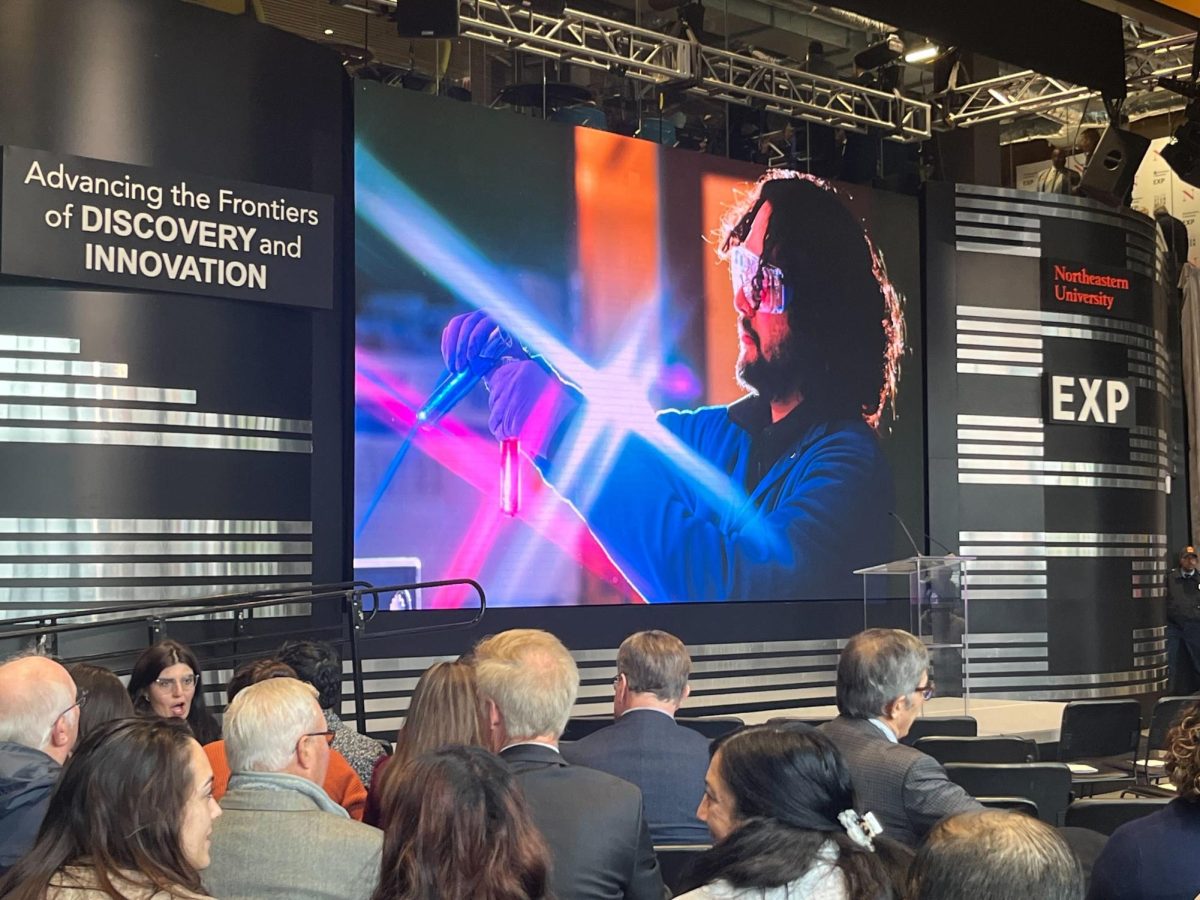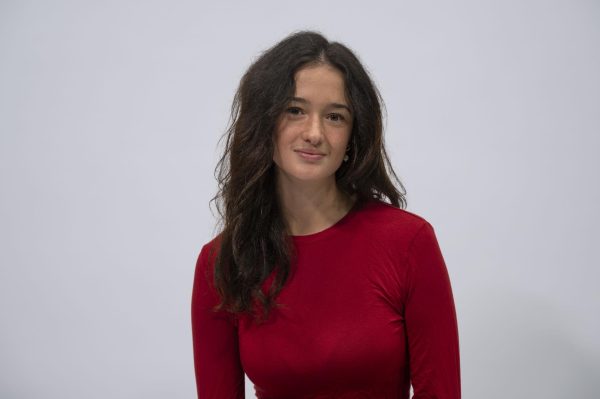On Monday, the Northeastern community, along with top state officials, celebrated the grand opening of the new EXP building. The venue was packed, leaving some audience members standing as they listened to speakers praise the building’s launch.
“Northeastern is not just a place to learn about science, technology and math — this is a place where students get their hands dirty by diving into real-world problems,” said Sen. Elizabeth Warren in Monday morning remarks to faculty, staff and students at EXP. “The EXP building is a testament to our commitment to scientific excellence and exploration. It is a place for the brightest minds to come together and solve the world’s most pressing problems and to make long-lasting contributions to science and technology.”
The event, framed as a ribbon-cutting ceremony, focused on the potential of technological advancements at Northeastern and the Boston area’s economic and educational progress. Other speakers included Governor Maura Healey, Boston Mayor Michelle Wu and more elected officials.
EXP, Northeastern’s newest education facility that has been in the works since 2012, The News previously reported, stands tall between Ruggles Station and its complementary building, the Interdisciplinary Science and Engineering Complex, or ISEC. The eight-story, 350,000-square-foot building on Columbus Avenue opened in September after three years of construction, marking a new chapter for the university’s innovation initiatives.
“The space is laid out to promote collaboration between students across disciplines, and will include teaching and research labs, classrooms, maker space, dedicated space for innovative work in autonomous vehicles, drones and robots, a cafe, and a faculty club,” Northeastern Facilities stated in the EXP’s project description, which was published during the construction of the building “EXP will enable students and researchers to network, connect, and collaborate, bringing a range of knowledge, experience, and perspective together.”
The collection of speakers emphasized the idea of collaboration and experience, collectively focusing on the opportunities for innovation, the importance of funding in academia and how the Northeastern community can work toward a more diverse, inclusive and equitable future.
View this post on Instagram
Following welcomes from James Tukpah, a Northeastern doctoral candidate, and Richard A. D’Amore, chair of the university’s Board of Trustees, Wu took the stage to express her pride in the local community and excitement for the opportunity the new space created for future jobs and innovation.
“Particularly in this moment, when Boston’s biotech and life sciences industries are accelerating and there are openings to be filled, we want to ensure it is our residents, our young people stepping into these positions — not just to benefit from this growth, but to drive it,” Wu said.
Governor Healey, who graduated from Northeastern School of Law in 1998, spoke next, sharing her hopes for the education opportunities that would come with the new building.
“I look forward to seeing all the many ways in which this university, and this facility, and the people who walk in and out of these doors, drive innovation, drive economic development, make the life-changing, world-changing differences that we so desperately need,” Healey said. “There’s so much good here to come and we are just so proud to have this right here in Massachusetts.”
Warren, who followed Healey, began her address in light spirits.
“Hello, people who believe in science,” Warren said. “I know, I know, believing in science doesn’t sound like it should be controversial, but please keep in mind, my day job is in Washington, D.C.”
Warren emphasized the potential of EXP, as well as the significance of scientific funding in education.
“The EXP building is an incredible example of what’s still to come,” Warren said. “It is an example of what investment in these state-of-the-art laboratories can mean for medical advancements. It is an investment in what lives can be saved thanks to advancements that students here make in robotics. It is an investment in what knowledge we can acquire about the oceans or outer space with the new equipment here.”
Rep. Ayanna Pressley of Massachusetts’ seventh congressional district, which houses Northeastern, stressed the importance of opening opportunities to current and potential students of color in Boston.
“The Massachusetts seventh congressional district is a district that is vibrant, diverse, dynamic and one of the most unequal in our country, and that has everything to do with historic federal underinvestment and really intentional policies,” Pressley said. “So, today’s celebration towards a more equitable and inclusive path forward is just an honor to be a part of and bear witness to so we can change the legacy of this district.”
Rep. Stephen F. Lynch of Massachusetts’ eighth congressional district, added to Pressley’s thoughts, addressing the impact Northeastern has on low-income students and students of color.
“Each year, I become more and more aware of the great work that Northeastern does in terms of providing opportunity for young people, many of them young people of color in my district,” Lynch said. “We have a wonderful constellation of universities in Boston and in Massachusetts, but no one does it better — no one is more generous to our families who wouldn’t otherwise have that opportunity than President Joseph Aoun.”
Rep. Jim McGovern, the father of a Northeastern alum and a current undergraduate student, expressed his enthusiasm and school pride for the EXP building.
“I am so excited for you to have this incredible gift of getting to use this new facility and I can’t wait to see what you are going to do with it,” McGovern said. “So whatever it is — as a congressman and as a Husky dad — I’m sure it will make us all very proud.”
Sethuraman Panchanathan, the director of the National Science Foundation, or NSF, a federal agency which supports the advancement of science through giving grants to academic institutions, took the stage to advocate for inclusivity in appropriating funds and to announce the university’s funding status. Panchanathan said Northeastern is one of the top three NSF funding recipients, following Woods Hole Oceanographic Institute and the Massachusetts Institute of Technology.
“Not one ounce of talent in our nation should be left behind,” Panchanathan said. “When you bring the inclusive mindset, you solve problems like climate change, like pandemics. You solve all of these problems in its fullest form and that’s what we need at this point in time.”
Biogen President and CEO Christopher A. Viehbacher followed Panchanathan to remark on the prestige of Northeastern and the success of the university in the technological community and lauded its dedication to scientific advancement.
“As a member of the Boston-Cambridge biotech community, I am particularly proud of Northeastern’s commitment to science,” Viehbacher said. “Since I’ve been a trustee, research grants have more than doubled. Northeastern has achieved prestigious recognition as an R1 institution for research activity, by the Carnegie Classification of Institutions of Higher Education. Only 148 institutions in the United States have achieved this recognition.”
University President Joseph E. Aoun concluded the ceremony by thanking speakers and attendees. The ceremony culminated with Aoun analyzing Northeastern’s influence.
“What is success? Success is going to be quantified by the impact that we have with our community, on our community, the impact we have on the city, the impact we have on the commonwealth and on the nation, and this impact is not going to be decided by Northeastern,” Aoun said. “We are here today, not to celebrate a building, but to celebrate a commitment for a better world, and this is something that will endure for many, many generations to come.”
Aoun’s remarks were followed by the ribbing cutting ceremony, in which each speaker took the stage to cut a piece of ribbon, symbolizing a new beginning for Northeastern University.











